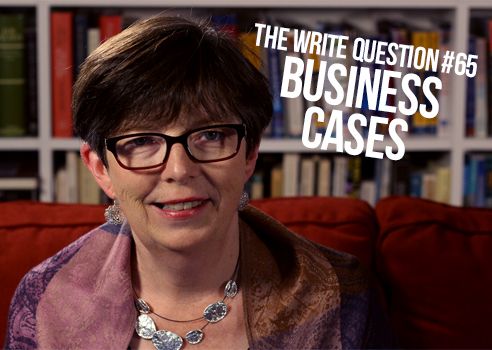Viewing time: 3 min. 54 sec.
The Write Question is a weekly video podcast about writing that I started in 2017 and that ran, more or less weekly, until April 2022. This is a republication of issue #65, with advice on how to make a business case for books. The post first ran on Sept. 14/18.
Transcript:
Welcome to The Write Question, I’m Daphne Gray-Grant. Today I’m talking about how to make a business case for books.
I have a question from reader Pranav Bhatnagar, who is based in New Delhi, India. Here’s what he’s asked.
“I have just finished writing a memoir and am now preparing a book proposal for it. Could you please give me some pointers on how I can build a compelling business case for the book?”
Thanks for the question, Pranav. You are wise to approach the concept of a business case for your book very carefully. It’s extremely hard to get a publishing deal these days and if you don’t have an outstanding book proposal, you’ll never get anywhere.
Keep in mind that memoirs are kind of a special category in themselves. Agents and publishers will be looking for outstanding writing and an unusual story. But, most of all, they’ll want to know that you have the start of a platform, which is to say, plenty of potential readers for your book.
So here’s where it gets interesting, and perhaps a little counterintuitive. Your business case should focus less on how many people might be interested in reading your book and more on how many people are already reading you. Here are some questions you should address as part of your business case:
- Do you have a blog? How many unique visitors do you get each month? (Google analytics can tell you that number, by the way.)
- Do you ever do guest posts on other blogs? How often? How well known are those blogs?
- Do you have a large Facebook following? How often do you post?
- Do you have a large number of Twitter followers? How many tweets do you post every day?
- How big is your LinkedIn network?
- Do you ever speak at conferences or workshops? If so, how many people typically attend?
Do you see the issue here? Many new authors typically try to pitch how many readers are interested in their subject area. For example, someone writing a book about cycling might want to say that bicycle sales are currently increasing the US and have gone from 51 million riders in 2012 to more than 66 million in 2017.
But no publisher is going to imagine that they could sell even a small fraction of books to that audience. Unless of course the author is Stephen King.
You need to understand that the vast majority of books don’t make a penny for the publisher. Instead, publishers are kept alive by the small handful of bestselling writers in their stables. The Stephen Kings. The Margaret Atwoods. The J.K. Rowlings. But publishers also need to take a chance on a small number of people in the hopes of finding another bestselling author. Remember that that number is small. And to be one of those people, you need to have a solid readership elsewhere, whether through blogging, Facebook, LinkedIn or any other form of public recognition. THAT is your business case.
If this requirement is too discouraging for you, Pranav, you might want to consider self-publishing, and I include a link below to a video I’ve done on that topic.
Finally, let me wrap up with a quote from ultra- successful author Seth Godin: “The future of publishing is about having connections to readers and the knowledge of what those readers want.”
Thanks for the question, Pranav. It is hard to get publishing deals these days and to do it you need a compelling business case.


